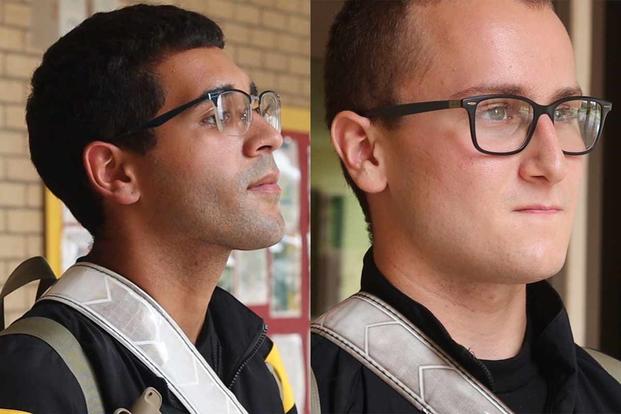After only a week of basic combat training at Fort Sill, Oklahoma, two privates stepped up and saved a buddy's life, according to a Sept. 17 release from the U.S. Army.
Pvt. Carlos Fontanez, originally from Bethlehem, Pennsylvania, said he had noticed something was off with his fellow trainee over the previous few days.
"He slept to the right of me. ... With previous events that had happened, I kind of realized maybe I should talk to him," he said.
Read Next: No More Drill Sergeant 'Shark Attack': Army Moves Toward Kinder Basic Training Start
Fontanez said he walked into the latrine and found the trainee using a PT belt as a noose.
"In the latrine, I saw what was going down, and I was just telling him, 'C'mon, think about what you're about to do.'"
Pvt. Ari Tilla, native of Rochester, New York, walked in soon after. "On Thursday morning [Sept. 3], I entered the latrines," he said. "I was doing some cleaning, and I heard a commotion off to my side. I saw Fontanez helping his battle buddy, who was in a mental health crisis, and we stepped in and got him the help that he needed."
The two worked together to save their fellow trainee.
"I lifted him up so he could breathe, and Till unclipped the PT belt, and we just got him down and stayed by him until he got help," Fontanez said.
Drill sergeants and cadre took over after Till and Fontanez had gotten the trainee out of immediate danger, the release states. The trainee is now safe and receiving professional medical care, it added.
According to the release, both Fontanez and Till have had friends or loved ones attempt or die by suicide.
Till said it's important not to ignore warning signs.
"If they're normally a social person and you see a distinct change in their mood, or the way they interact with the people around them," those can be warning signs, he said.
If someone isn't getting enough sleep, food or other basic needs, that can be a sign that they are in crisis, Fontanez added. "Really, just pay attention to everything that's going on," he said.
Lt. Col. Mark Larson, commander of 1st Battalion, 19th Field Artillery, presented the two with a unit coin.
"On the first day, I didn't know if I wanted to keep it here with me because of my personal relationship with people who have had problems with that. I didn't want a reminder," Till said. "But the longer time has passed, I like having it because it is a reminder that [he] is OK, and there are people out there that will do the right thing."
Fontanez agreed.
"I like having it. I see it every day, realize what Till and I did, and it kind of just brings me to the point where it's like, you know, he's still here with us," he said.
If you or someone you know is in crisis, you can reach the National Suicide Prevention Lifeline at 1-800-273-TALK (8255). Press 1 for the Military Crisis Line; you can also text 838255.
-- Bing Xiao can be reached at bingxiao2020@u.northwestern.edu.
Related: As Suicides Near 100 in 2020, Air Force Creates ‘Playbook’ for Commanders













